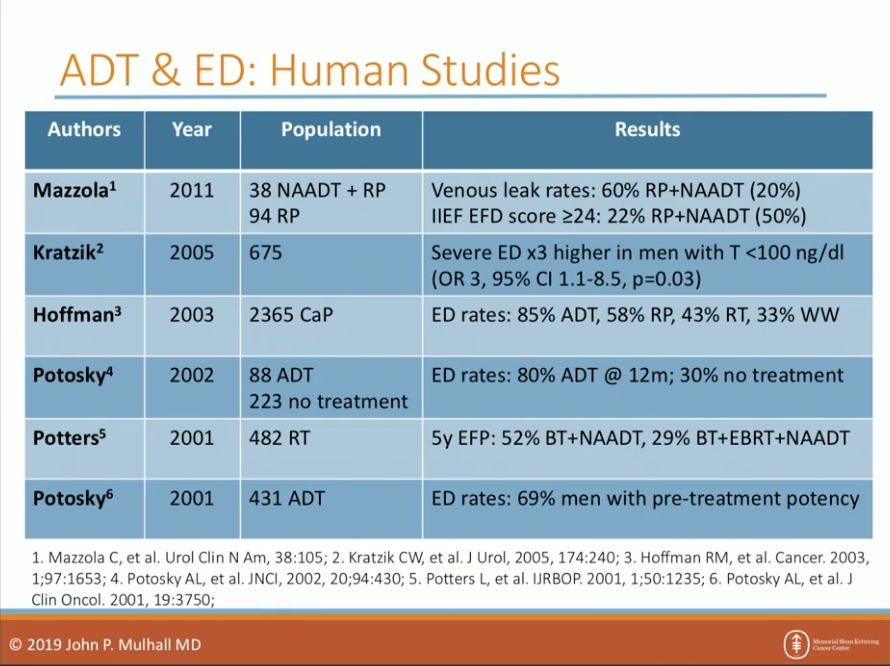John P. Mulhall, MD, presented “Testosterone Recovery Profiles After Cessation of Androgen Deprivation Therapy” during the 39th Annual Ralph E. Hopkins Urology Seminar on January 30th, 2019 in Jackson Hole, Wyoming.
How to cite: Mulhall, John P. “Testosterone Recovery Profiles After Cessation of Androgen Deprivation Therapy” January 30th, 2019. Accessed Dec 2025. https://grandroundsinurology.com/Testosterone-Recovery-Profiles-After-Cessation-of-Androgen-Deprivation-Therapy/
Testosterone Recovery Profiles After Cessation of Androgen Deprivation Therapy – Summary:
John P. Mulhall, MD, discusses the significant sexual and non-sexual adverse events of low testosterone resulting from using androgen deprivation therapy (ADT) to treat men with prostate cancer. He emphasizes the need for physicians to counsel patients on long-term expectations and to obtain fully-informed consent prior to the initiation of this therapy.
Abstract:
The utilization of ADT for the treatment of prostate cancer is increasingly common, and its role in metastatic disease—in conjunction with radiation therapy—in the neoadjuvant pre-radical prostatectomy setting is constantly evolving.
Unfortunately, there are significant sexual and non-sexual consequences that result from depleted or very low testosterone in men. Historically, ADT has negatively impacted erectile function.
Furthermore, free testosterone levels correlate with orgasm function. In an evaluation of orgasm profiles in patients receiving ADT, the mean time to complete loss of orgasm was 5 months on therapy, and all patients had a significant reduction in orgasm intensity. The non-sexual sequelae of ADT include the reduction of insulin sensitivity, an increased risk of diabetes, cardiovascular events, bone density loss, and increased mortality.
Despite the fact that incomplete testosterone recovery is common after cessation of ADT, an alarming number of men treated with ADT, as well as their partners, lack an awareness of its negative effects. For these reasons, it is essential that physicians assess baseline total testosterone levels in men and counsel patients about long-term expectations prior to the initiation of ADT.
About the Ralph E. Hopkins Urology Seminar
The Ralph E. Hopkins Urology Seminar, or Jackson Hole Seminars (JHS), is a multi-day conference that focuses on patient safety and cutting-edge updates in the assessment, diagnosis, and treatment of urologic conditions. The topics discussed include urologic cancers, stone disease, urologic reconstruction, female urology, infertility, emerging surgical techniques, and general urology. In addition to didactic expert lectures, this conference features a unique interactive critique panel. Dr. Mulhall presented this lecture during the 39th Annual JHS. Please visit this page in order to register for future JHS meetings.
ABOUT THE AUTHOR
John P. Mulhall, MD, is the director of the Male Sexual and Reproductive Medicine Program and the director of the Sexual Medicine Research Laboratory at Memorial Sloan-Kettering Cancer Center (MSKCC) in New York City. Dr. Mulhall holds an adjunct position as Professor of Urology in the Department of Urology at Weill Cornell Medical College. He earned his medical degree from University College Dublin in Ireland and completed his urology residency training at University of Connecticut Health Center and his sexual/reproductive medicine & surgery fellowship training at Boston University Medical Center. Dr. Mulhall has spent more than a decade studying radical prostatectomy associated with sexual dysfunctions and Peyronie’s Disease in laboratory and in clinical studies. His basic research interests include defining the pathobiology of Peyronie’s disease fibroblasts and erectile function preservation in cavernous nerve injury models.
Dr. Mullhall is a board-certified urologist and a microsurgeon who specializes in sexual and reproductive medicine and surgery. As a microsurgeon, he performs delicate procedures using operating microscopes and miniaturized precision instruments on the very small structures in the genitourinary tract. As part of Memorial Sloan Kettering Cancer Center’s Survivorship Initiative, Dr. Mulhall and his team have established a Male Sexual and Reproductive Medicine Program, which is devoted entirely to the care of men who have suffered sexual difficulties or fertility problems as a result of their cancer or cancer treatment. He directs the sexual and reproductive medicine team, which includes a nurse practitioner, a nurse, and a psychologist.

